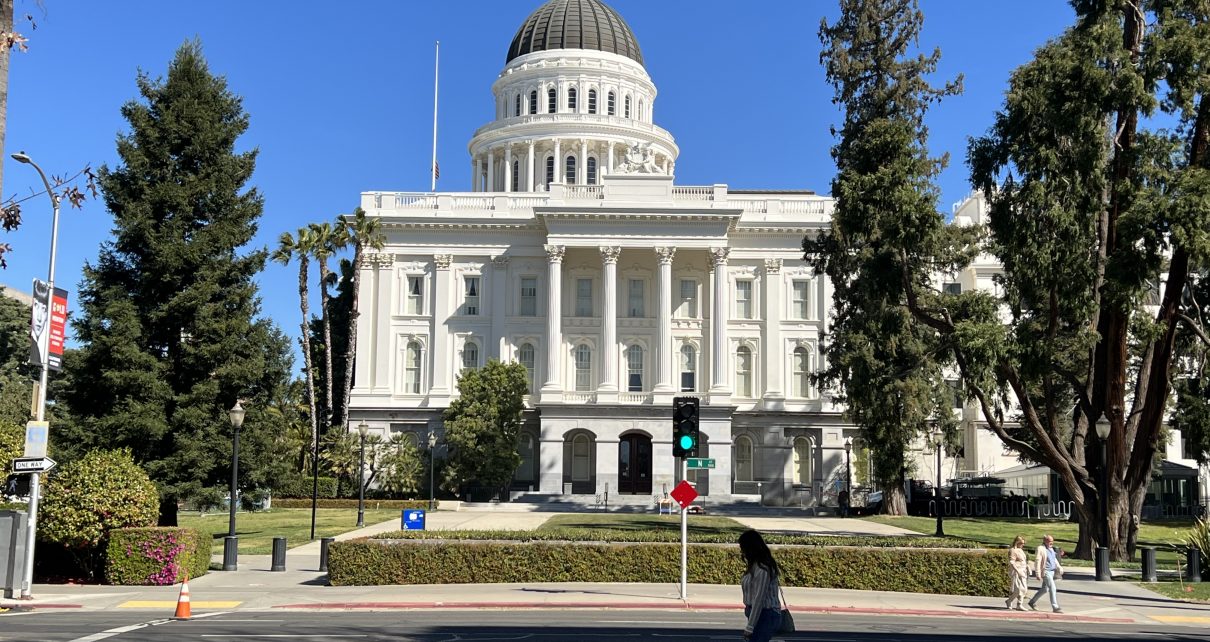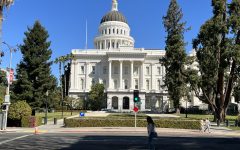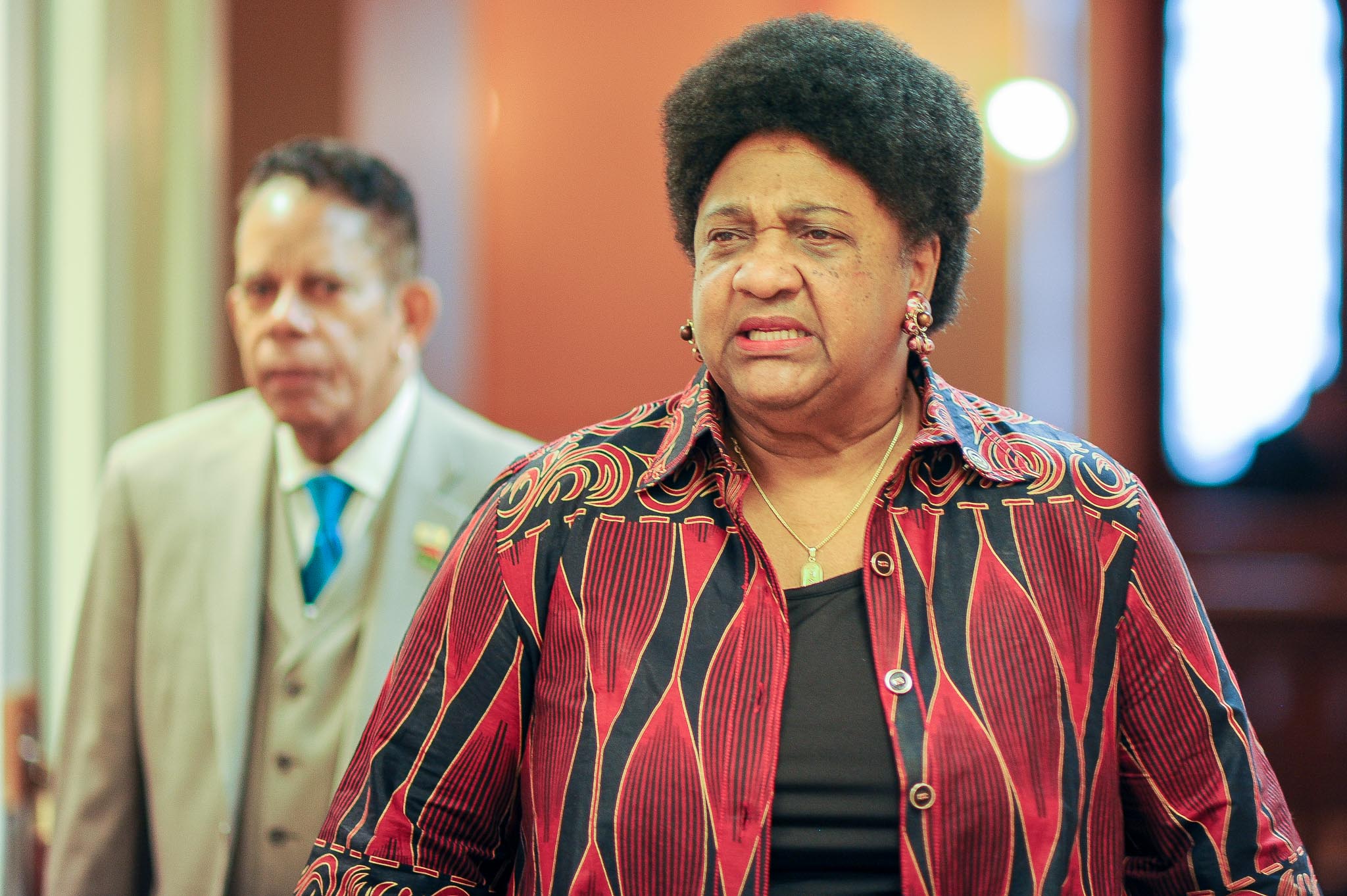
California State Capitol on March 11, 2022. (Photo: Kevin Sanders for California Globe).
New Poll Finds 59% Of Californians Outright Oppose Cash Reparation Payments
‘Californians, just like the majority of Americans, hate this idea’
By Evan Symon, September 11, 2023 4:55 pm
According to a new UC Berkeley Institute of Governmental Studies (IGS) poll released during the weekend, 59% of all Californians oppose cash reparations payments, with only 28% in favor of them, slowing the momentum for any possible legislation for a vote on reparations in the coming years.
Ever since the California Reparations Task Force was first set up in 2020 following a renewed effort for reparations in the wake of the George Floyd incident earlier that year, the question about reparations being given to black Californians has faced a rocky road. Even before any meetings were held, many questioned why reparations should even be given in California, as it was a union state during the Civil War, and not a slave state, as well as the fact that there is no one still alive who was a slave.
While reparations were paid by the federal government in 1988 to Japanese internment camp survivors, the money only went to living survivors.
Based upon arguments that the reparations would be instead for years of housing segregation, education injustice, an unjust legal system, and other social issues, the Task Force soon divided even more Californians after the first meetings. The panel voted 5-4 in March 2022 to limit payments only to descendants of slaves, and not black Californians of other ancestry. Money has also been a huge issue. Some estimates said that $569 billion was owed to black residents. Another one gave the figure of $1.2 million per each black resident. And then there was the final $800 billion estimate, – Task Force Members had to repeatedly ask the media to stop focusing on as the amount as it was being scrutinized nationwide. Despite this, the Task Force approved the $800 billion recommended figure in May.
While the final report was released the next month with the hope of having legislation crafted from it in the near future, it proved to be very trying. By that point, support for reparations remained low. The Task Force itself had support from only 39% of Californians in June according to a PPIC poll. Governor Gavin Newsom also dealt a huge blow to those in favor of reparations by saying that he would not support any cash payments.
Support waned even further, leading to the IGS poll on Sunday. According to the poll, only 28% of Californians approve of giving cash payment reparations. Conversely, 59% oppose cash payment reparations, with 13% having no opinion. When broken down by race, 76% of black residents favor cash payment reparations, but with other races not even coming close, with whites being at 25%, Asians at 23% and Latinos at 24%. Opposition figures were almost a perfect flip, with 65% of whites and 59% of Asians and Latinos opposing such reparations. Black voters, meanwhile had only 16% in opposition.
Age was also a big factor, with older voters skewing more in opposition to reparations. While the youngest group, 18-29 year-olds, had the greatest percentage in favor of reparations, they still ultimately fell short to those opposing them in that age group, with 34% in favor and 47% against. Meanwhile those 65 and older had only 23% in favor and 69% against.
Political party results were similar: Democrats were split, with 43% wanting cash reparations and 42% against them. Republicans were largely against reparations, with only 3% in favor and a whopping 91% against them. Voters with no party affiliation, meanwhile, had only 24% in favor, with 63% against.
A majority of Californians against cash reparations payments
IGS Co-Director Cristina Mora said in a statement that “The findings reveal the racial and political contradictions of California voters. While many can empathize with the plight of Black Americans, not all of these feelings will translate into support for policies that address long standing racial harms. And though this might be an information issue for some groups, the fact that even liberals are divided indicates that campaigns for racial redress will face a steep uphill climb.”
Experts on the matter put it even more bluntly.
“Californians, just like the majority of Americans, hate this idea,” said Legal adviser Richard Weaver. “Look at California. Yes, there has been housing discrimination, law enforcement trouble, and other things that have been linked racially in the past in the state. California is not free of sin so to say. But there have been a ton of law corrections, legal settlements, and so much else. And that isn’t even getting into the fact that these proposed reparations are tied directly to slavery when California itself was a free state. Look at how many black Americans came to California over the years, especially during the Great Migration in the 1930s. It held so much opportunity for them, just like all Americans.”
“And then there is the amount. California, even on the lower estimates of what the hundreds of billions that reparations could cost, cannot afford them. It’s crazy. So add all that together, as well as a lot of flaws in their final report, and you see why the vast majority of Californians oppose reparations. The poll numbers should not be a surprise to anyone. Even the groups you think would be for it, like younger people or liberals, are either split on it or also against it. Latinos, who generally lead Democrat, were on pace with whites and Asians in being against it. Moderates hate reparations.”
“When it comes to issues that go to voters, California shows that they aren’t as liberal as people think they are. Look at how many times they voted against affirmative action and other issues.”
“For anyone in the Assembly or Senate who was looking at making the reparations into a bill, something that would need to go to voters mind you, this poll just threw a major wrench into those plans. Along with Newsom saying that he would not support cash payments, this is Californians saying that they do not want this and that if reparations have any chance they will all have to be non-monetary. Hopefully, the legislature hears them. Any sane lawmaker will hear them and not progress this.”
Possible bills based on the Task Forces’ report could come as soon as next year.
- San Francisco Cruise Robotaxi Folds Following $10 Billion In Losses - December 11, 2024
- New Information Shows UnitedHealthcare CEO’s Assassin Has California Ties - December 10, 2024
- Boeing To Cut 536 Jobs From California Following Several Years Of Major Incidents, Losses - December 10, 2024




